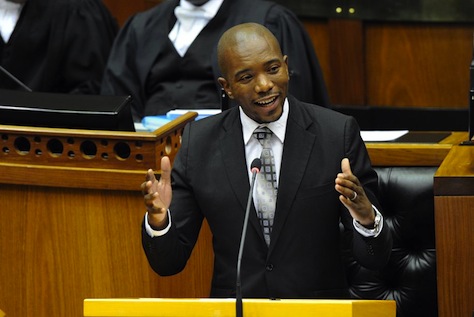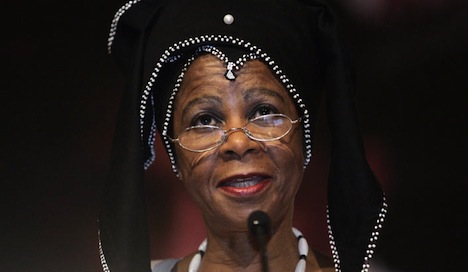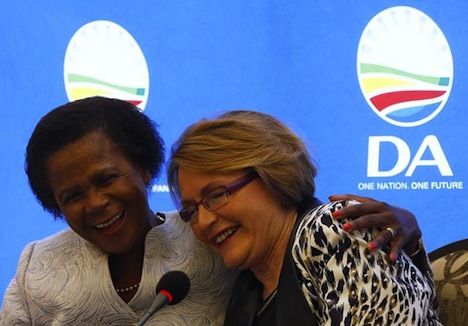 Photo credit to Lulama Zenzile / Foto24.
Photo credit to Lulama Zenzile / Foto24.
With four years to go in her second term as premier of Western Cape province, Helen Zille announced Monday that she would not go forward as the leader of South Africa’s opposition party, the Democratic Alliance (DA). ![]()
That opens the way for the DA’s parliamentary leader, Mmusi Maimane, to win the leadership in three weeks’ time at the party congress. If he wins, as is very likely, it will be the first time that a black South African will lead the country’s chief opposition party. It comes at a time when both Maimane and Julius Malema, the leader of the radical Economic Freedom Fighters (EFF), are making headlines by challenging president Jacob Zuma, whose ruling African National Congress (ANC) has dominated South African politics and governance since the end of apartheid in 1994.
At age 34, Maimane is part of the generation a bit too young to join the resistance struggle against apartheid. Nevertheless, he has consistently outperformed his party as a member of the South African National Assembly from Gauteng — the largest of South Africa’s provinces, and home to both Johannesburg, the country’s largest city, and Pretoria, its capital. In the 2014 election, Maimane won 30.8% of the vote in Gauteng to just 53.6% for the ANC, and also he performed strongly in the 2011 Johannesburg mayoral election. Strong performances alone, however, that boost the DA’s support to the 30% threshold, will not create a true two-party system in South Africa.
* * * * *
RELATED: Who is Mmusi Maimane?
Possibly the next premier of Gauteng.
RELATED: Even with victory assured, is the ANC’s future at risk?
* * * * *
In contrast to ANC propaganda that sharply denounces the Democratic Alliance as a white-dominated vehicle for post-colonial oppression, Zille was a celebrated journalist who worked to uncover the injustices of minority rule in South Africa during the 1980s and 1990s. In 2004, the Democratic Alliance won just 12.4% of the popular vote. After Zille took control of the leadership, the party won control of Western Cape province and increased the DA’s national share of the vote to 22.2% in the May 2014 general election. Nevertheless, when the ANC, under Zuma’s weak leadership, can still command over 62% of the vote, it’s clear that there’s a ceiling to the support that a party led by a white South African will command in a country where the racial nature of politics runs deep.
That doesn’t mean that Maimane’s probable ascension as the party’s next leader will solve the party’s image problem, and Maimane might be well-advised to rename and rebrand the party as his first priority if elected as its next leader. Even under the best conditions possible for the Democratic Alliance, it’s inconceivable to believe that the ANC will be dislodged in the next election in 2019 or even perhaps the 2024 election. But Maimane, whose father grew up in the notorious Soweto slum, can present a fresh contrast to an increasingly geriatric ruling class. Zuma will be 77 when his second term ends. His most likely successor, vice president Cyril Ramaphosa, is currently 62 years old, and he first seriously contested the ANC’s leadership in the late 1990s, when Thabo Mbeki edged him out for the opportunity to succeed Nelson Mandela. Continue reading Maimane, sudden favorite to lead the DA, faces uphill battle

